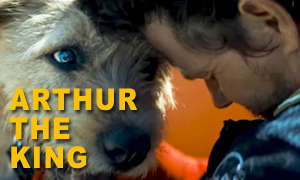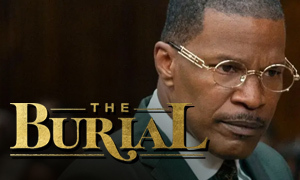The Last Duel: History vs. Hollywood
Did Jean de Carrouges have a wife prior to his marriage to Marguerite?
Yes. The Last Duel true story reveals that prior to his marriage to Marguerite de Thibouville in 1380, Jean de Carrouges had been married to Jeanne de Tilly, the Lord of Chambois' daughter. The two were married in the early 1370s. Jeanne gave birth to a son not long after their wedding. Carrouges' friend and neighbor, Jacques Le Gris, was chosen to be the boy's godfather. In the late 1370s, tragedy struck the family when both Jeanne and their son died of unknown natural causes, likely illness. To help channel his grief, Carrouges left home to fight the English under the command of Jean de Vienne in a five-month campaign. -Eric Jager
Is Ben Affleck's character, Count Pierre d'Alençon, based on a real person?
Yes. Like in The Last Duel movie, the true story confirms that Pierre d'Alençon (portrayed by Ben Affleck) was the cousin of King Charles VI and the overlord of both Jean de Carrouges (Matt Damon) and Jacques Le Gris (Adam Driver). Count Pierre had inherited the county of Perche from his brother Robert and with it the fealty of his brother's vassals, including Carrouges and Le Gris.
Were Jean de Carrouges and Jacques Le Gris friends before they became rivals?
Yes. As indicated earlier, the two men were initially neighbors and friends. However, after both men joined the court circle of their new overlord, Count Pierre d'Alençon, their friendship deteriorated when the Count began to favor Jacques Le Gris (played by Adam Driver) and overlooked Jean de Carrouges (portrayed by Matt Damon). In researching The Last Duel's historical accuracy, we learned that Le Gris brought in more money and was educated, making him more valuable to the court. The Count rewarded Le Gris' service on the court with a newly purchased estate at Aunou-le-Faucon. Le Gris also inherited his father's lordship of the castle at Exmes. This made Carrouges jealous of Le Gris and they became rivals on the court.
Though actor Adam Driver is more than ten years younger than Matt Damon, who is in his early fifties, the real Le Gris and Carrouges were both in their mid-fifties and approximately the same age.
Did Jean de Carrouges sue his overlord, Count Pierre d'Alençon?
Yes. By marrying Marguerite de Thibouville, who at the time was described as "young, beautiful, good, sensible and modest," Jean de Carrouges hoped to inherit the valuable estate of Aunou-le-Faucon that had been previously owned by Marguerite's father. This was the estate that Count Pierre d'Alençon had given to Jacques Le Gris. Carrouges felt that he was entitled to the valuable piece of property based on his father-in-law's previous claim. His lawsuit was undoubtedly fueled by his jealousy of Le Gris. Count Pierre went to his cousin, King Charles VI, to officially confirm his ownership of Aunou-le-Faucon and his right to give it to Le Gris. Carrouges lost the suit and further strained his relationship with Count Pierre's circle. -Eric Jager
Is The Last Duel based on a book?
Yes. The movie is based on Eric Jager's 2004 book The Last Duel: A True Story of Trial by Combat in Medieval France. Jager is an English professor at UCLA. The book also inspired a similarly titled 2008 drama-documentary that chronicled the Jean de Carrouges duel, which aired on BBC Four.
Did knight Jean de Carrouges charge squire Jacques Le Gris with raping his wife?
Yes. The Last Duel true story confirms that the charge, to which Le Gris denied, is what led to the Jean de Carrouges and Jacques Le Gris' duel. The circumstances surrounding the rape unfold in the movie much like author Eric Jager describes it in the book. Carrouges had set off on a trip to Paris and his wife Marguerite was home alone on the morning of January 18, 1386. Her mother-in-law had left to tend to legal business in a neighboring town and took almost all of the servants with her.
According to Marguerite, a man-at-arms named Adam Louvel showed up at the chateau door asking about a loan he owed her husband. He then told her that Jacques Le Gris was outside and insisted on seeing her. When she refused, Louvel pleaded, telling her that Le Gris loved her and "will do anything for you and he greatly desires to see you." Marguerite tried to deny them access but Le Gris forced his way into the home. He propositioned her, telling her he would pay her to keep silent of the affair. When she said no, he violently raped her with the help of Louvel and told her that he'd kill her if she spoke of what happened. When her husband returned several days later, she told him of the attack. Carrouges decided to bring legal charges against Le Gris.
Did squire Jacques Le Gris rape the wife of knight Jean de Carrouges?
The truth of whether squire Jacques Le Gris raped Marguerite de Carrouges, the wife of Norman knight Jean de Carrouges, is unknown and has been a subject of debate among historians and jurists. Jacques Le Gris lawyer, Jean Le Coq, who was almost certainly an eyewitness to the duel, recorded his thoughts on the case in a personal notebook, the text of which has endured through the ages. While he did outline arguments that supported his client, he also expressed private doubts regarding the innocence of Le Gris. While facing death at the end of the judicial duel, Le Gris never admitted to the charge. However, confessing would have damned him to the same fate. -HROARR
The author of The Last Duel book, Eric Jager, told the podcast Most Notorious that while at first he had doubts regarding Marguerite's claims, he changed his mind after reading the court records, especially her testimony. "I remain very much one of those who believes Marguerite's story," said Jager, "but there is a lot we don't know about this case, and people will inevitably make up their own minds."
Why did Jean de Carrouges want a trial by combat?
The Last Duel fact-check confirms that Carrouges felt that the initial legal proceedings were heavily tilted against himself and his wife. Count Pierre d'Alençon, who was an ally of Jacques Le Gris, presided over the local trial. Carrouges had such little faith that he would receive a just outcome, neither he nor his wife showed up at the proceedings. Furthermore, the word of Marguerite, the only witness, carried little weight in this time period. As expected, Count Pierre dropped the charge against Le Gris. In response, Carrouges went to Paris and appealed directly to King Charles VI.
Knowing that his wife Marguerite de Carrouges' testimony didn't carry much weight, he decided to appeal to the King and the French court for the necessity of a judicial duel, also known as a trial by combat. On July 9, 1386 at the Palais de Justice in Paris, Jean de Carrouges and Jacques Le Gris presented themselves to Parliament to issue the formal challenge. A gauntlet was thrown down to symbolize their desire to fight. The King and the Parliament of Paris decided that they would first hear the case as a regular criminal trial, and they would later decide on whether to grant a trial by combat after both sides had provided their testimony.
The lengthy criminal trial lasted most of the summer. Le Gris accused Carrouges of inventing the accusation out of jealousy and anger. It was also suggested that Marguerite had imagined the attack or that it was a case of mistaken identity. Carrouges reasoned that it didn't make sense for him to make up the allegation, seeing how the trial had brought shame to his family. He also poked holes in Le Gris alibi by proving that the fifty-mile roundtrip was possible on horseback. Further compromising Le Gris' alibi was the fact that the man providing it, squire Jean Beloteau, was arrested for rape in Paris during the trial. In the end, the Parliament of Paris was unable to determine guilt in the case. As a result, they permitted the judicial duel to take place, which were rare by 1386. The idea was that God would decide guilt and innocence by whoever was left standing at the end of the duel. As Carrouges (Matt Damon) says in the movie, "One of us has lied. Let us let God decide."
Did the alleged rape of Marguerite de Carrouges result in a pregnancy?
According to Eric Jager's book The Last Duel, the alleged rape of Jean de Carrouges' wife Marguerite happened on January 18, 1386. By the time the criminal trial was underway in the summer of that year, Marguerite was noticeably pregnant. While this should have added weight to Marguerite's claim, it did not. According to medical knowledge at the time, children could not be conceived out of rape, therefore Marguerite's physical state was determined to have no relevance to the case.
By the time of her husband Jean de Carrouges' duel in late December, Marguerite's son Robert had been born. He was a healthy baby boy. During our investigation into The Last Duel's historical accuracy, we discovered that French Queen Isabeau of Bavaria, who is portrayed by Serena Kennedy in the movie, had also given birth to a boy during that time, but the baby was sickly and died the day before the duel.
Is it true that Jean de Carrouges' wife, Marguerite de Carrouges, would be burned at the stake if her husband lost the duel?
Yes. The idea was that if her husband lost the duel, the outcome would "prove" that Marguerite was guilty of perjury, meaning that her claim that she was raped would be considered a lie. She would then be immediately taken to Montfaucon and burned at the stake.
Where did Jean de Carrouges and Jacques Le Gris' duel take place?
As depicted in the Ridley Scott movie, The Last Duel true story affirms that the real trial by combat took place next to an inside wall of the Priory of Saint-Martin-des-Champs, an important monastery that was located in what is today the city of Paris. At the time, it was located outside the walls of the city, hence it being referred to as "des champs" (in the fields). The priory's surviving buildings have been home to the Museum of Arts and Crafts (Musée des Arts et Métiers) since 1802. A historical rendering of The Last Duel's real-life location is displayed below, along with an image of one of the surviving buildings.
Was King Charles VI present at the duel between Jean de Carrouges and Jacques Le Gris?
Yes. There is little dispute over whether or not the King was at the December 29, 1386 duel. The two contemporary historical accounts of the duel that are considered the most reliable (because they were likely eyewitness accounts) mention the King being present, and we found no accounts denying it. In fact, according to the writings of the Monk of Saint-Denis, the King's official historian, the duel was initially set for November 27, 1386. However, as stated in Eric Jager's book, King Charles VI was delayed on his return trip to Paris due to bad roads in Flanders. He sent a messenger to Paris, ordering that Jean de Carrouges' duel be postponed a month so that he would be able to attend. It was then rescheduled for December 29, 1386. The King's family was present, including several royal dukes. Many of the most esteemed French nobles were in attendance as well, along with thousands of ordinary French citizens. It's true that the King, who came to the throne when he was 11, was 18 at the time of the duel and still rather young.
Was Marguerite de Carrouges present at the duel?
In Eric Jager's book, Marguerite is dressed in black and sitting in a carriage overlooking the field. However, in the personal notes of Jacques Le Gris' lawyer, Jean Le Coq, who was likely an eyewitness, he states that the wife of Jean de Carrouges "was brought in a cart, but swiftly sent back by order of the King." Therefore, it is unlikely that the real Marguerite saw the duel. The movie places her even closer for dramatic effect.
Was Jean de Carrouges sick at the time of the duel?
While carrying out The Last Duel fact-check, we discovered that two of the most trusted contemporary historical texts that describe the duel mention that Carrouges (Matt Damon in the movie) was weak because of fevers. Jean Le Coq, the lawyer of Jacques Le Gris who likely witnessed the duel, stated that "even though Carrouges was weak because of fevers, he himself said they helped him."
Was Jacques Le Gris made a knight just before the duel began?
Yes. The personal notes of Le Gris' lawyer, Jean Le Coq, describe him as being made a knight "a little before he entered the field." The idea was that if Le Gris was made a knight, then the two men would be of equal standing during the fight.
Did the real-life duel unfold like it does in the movie?
No. There are five contemporary historical texts that describe the duel. Two of those texts, one written by the Monk of Saint-Denis, Michel Pintoin, and the other written by Jacques Le Gris' lawyer, Jean Le Coq, are likely firsthand accounts and are considered to be the most accurate. Pintoin was King Charles VI's official historian and was often at the King's side.
In The Last Duel movie and book, the battle begins with a joust. However, both Pintoin and Le Coq describe Jean de Carrouges and Jacques Le Gris as "abandoning their horses as soon as the marshal gave the signal for mutual attack." Le Coq stated that some people thought the lists (the barriers built to enclose the jousting area) were too small for lance combat, stating that "they had been made for two men who fought on foot and not on horses."
In the less reliable text of Jean Froissart, a contemporary of Carrouges and Le Gris, he states that the two men "jousted for the first engagement, but nothing was forfeited." His book that contained the account was published in 1390, less than four years after the duel took place. However, Froissart was living in the Netherlands at the time and was not present for the fight. He heard the story later from unknown sources. Of the five medieval texts that describe the duel, Froissart's is the only one that mentions a joust. To enrich the scene, Eric Jager, author of The Last Duel, quotes Froissart's account of an entirely different event, the Saint-Inglevert jousts of 1390.
With the two most reliable accounts describing the duel as unfolding entirely on foot, the account of Michel Pintoin, King Charles VI's official historian, states that the duel began with the two men holding their "threatening swords lowered" as they approached each other. In the first attack, Jacques Le Gris pierced Jean de Carrouges in the thigh with his sword (In the movie, Le Gris stabs Carrouges in the thigh with the broken-off tip of a jousting lance). Instead of pressing the sword in deeper, Le Gris immediately drew it out. Blood emerged from the wound, which grabbed the attention of the crowd. Pintoin said that despite Carrouges' wound, "it increased his courage rather than his confusion."
He then describes Carrouges as stepping in closer, grabbing Le Gris by the helmet, and throwing him to the ground face down. In the book, Eric Jager says that either the weight of Le Gris armor, exhaustion from fighting, or the shock of being thrown to the ground kept Le Gris from rising to his feet. However, the weight of Le Gris' plate armor alone would not have kept him from getting up. Pintoin states that Carrouges killed his enemy "with great difficulty" due to the armor. We know that it took some time for Carrouges to kill Le Gris due to the fact that Carrouges had time to demand that Le Gris confess to the rape and Le Gris had time to maintain his innocence. The gruesome nature of the battle may be one reason why the Parliament of Paris never sanctioned another judicial duel. -HROARR
Did the duel include an axe fight?
Jean de Carrouges (Matt Damon) fighting Jacques Le Gris (Adam Driver) with an axe is unlikely to have occurred in real life, as it does not appear in any of the five contemporary historical texts that describe the duel. Of everything that unfolds during the duel between Carrouges and Le Gris in the movie, this is arguably the least historically accurate element.
Did Jean de Carrouges' horse die during the duel?
No. This appears to be movie fiction that was drawn from a fictional element in Eric Jager's book The Last Duel. King Charles VI's official historian, Michel Pintoin, who was likely at his side and observed the duel, wrote that the two men "abandoned their horses" at the start of the battle. Jean Froissart, who was living in the kingdom of the Netherlands at the time, wrote about the duel several years after it took place and stated that the two men "arranged themselves on foot" after first being on their horses. None of the contemporary historical accounts of the duel mention either of the horses dying during the duel.
Did the two men hold shields during the duel?
It's possible that the two men held shields during the fight, but it seems unlikely given that Carrouges had his sword in his right hand and grappled Le Gris with his left hand, throwing him to the ground. Eric Jager's book describes the lance heads being buried in the shields during the joust. The shields are then damaged more when they are hacked at in the book's almost-certainly-fictional equestrian axe battle. Even if we were to take Jager and the movie's account as fact, the shields would not have magically regenerated for the sword fight, as they seem to do in Jager's book.
Are the swords used during the duel accurate?
In his book, Eric Jager portrays Jean de Carrouges and Jacques Le Gris as using single-handed cutting and thrusting swords worn on their belts, which he somewhat confusingly refers to as "estocs." Most estocs (or tucks) that we've researched are two-handed. It seems just as possible that they would have been using longswords in 1386, especially given that they were fully armored. Specifically, these would have likely been standard 14th-century type XV arming swords. If they were indeed using longswords, it's also possible they were half-swording. This involves gripping the sword blade near the center with the opposite hand in order to deliver more forceful blows into an opponent's armor. -HROARR
Did the duel end with the two men ground fighting with daggers?
No, at least not according to the historians and observers who chronicled the duel. The King's official historian, the Monk of Saint-Denis, who is believed to have been present at the duel, said that after Jean de Carrouges grabbed Jacques Le Gris' helmet and threw him to the ground, "he drew his sword and killed his enemy with great difficulty, because he was encased in armour." It doesn't make sense that Carrouges would draw his sword at that point since he had already been fighting with it. However, it does make sense that he drew a second, smaller sword that would have been easier to use to finish off a downed Le Gris.
Breton historian Guy Alexis Lobineau wrote about a duel that took place nine days prior to the Carrouges and Le Gris duel. Legal documents from that duel state that each man was allowed to carry two swords, one longer and one shorter, so it makes sense that similar rules would have applied here as well.
Did Jean de Carrouges lift Jacques Le Gris' visor and stab him in the throat?
Not likely. The most reliable historical accounts of The Last Duel true story do not mention Carrouges lifting Le Gris' visor and stabbing him in the throat. The book's author, Eric Jager, seems to possibly be drawing this from later, less reliable retellings. Revealing Le Gris' face certainly adds to the drama in the movie and book, especially since we know that Carrouges repeatedly demanded that Le Gris admit he raped Marguerite. Jager also describes Carrouges fumbling with the lock on Le Gris' visor, yet there is no evidence of such locks existing this early in history.
Was the body of Jacques Le Gris hung on public display after the duel?
Le Gris' lifeless body was reportedly taken to the gibbet (a structure or gallows from which dead or dying bodies were hung for public display) at Montfaucon located outside the walls of Paris. A historical rendering of the gibbet at Montfaucon is displayed below. Le Gris body was hung from chains where it was left to rot for the next several months as a reminder of the fate of rapists, liars, traitors, etc.
Was the duel between Jean de Carrouges and Jacques Le Gris the last officially recognized judicial duel held in France?
Yes. The December 29, 1386 duel between Norman knight Jean de Carrouges (Matt Damon in the movie) and Jacques Le Gris (played by Adam Driver) was the last officially recognized trial by combat in the jurisdiction of the Parliament of Paris. Judicial duels had already become rare by that point.
Did the victory help Sir Jean de Carrouges better his standing in life?
Yes. Carrouges' victory at the duel allowed him to rise financially and professionally. According to medieval historian Jean Froissart, Carrouges was awarded 1,000 francs along with a royal income of 200 francs per year. A few weeks after the fight, Parliament awarded him an additional 6,000 livres in gold and he was given the position of King Charles VI's royal squire.
His wife, Marguerite de Carrouges, was saved from a fate of being burned at the stake. Together, they became celebrities and extended their wealth by way of gifts and investments. In the years following the trial by combat, they had two more children. Jean de Carrouges died in battle fighting the Ottoman Turks roughly a decade after the duel.
Overall, how accurate is The Last Duel movie?
In order to determine the overall accuracy of Ridley Scott's The Last Duel, we have to look at the accuracy of author Eric Jager's book on which the movie was based. We know that various parts of Jager's book are fiction. In the author's note, he admits as much, stating, "Where the historical record is silent, I use my own invention to fill in some of the gaps." Jager's substantial lack of references and footnotes, in addition to his questionable understanding of the weapons and armor of that period, raises significant doubt around the book's overall historical accuracy. The book itself seems to take the level of creative license that is usually reserved for films.
Based on the most reliable medieval accounts describing the duel, the movie's version bears little resemblance to those historical texts. Jean de Carrouges and Jacques Le Gris almost certainly did not joust, nor did Le Gris kill Carrouges' horse. There's also no mention of an axe fight. Much like how the story of the duel itself seems to have been embellished over the years, the lengthy climactic duel in the movie and book draws from those accounts and is similarly dramatized for dramatic effect. The scenes that focus on the events surrounding the assault hue closest to history, as they were drawn straight from Marguerite de Carrouges' testimony.







